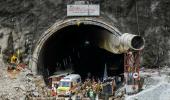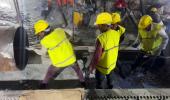Pushkar Singh Airay, one of the 41 workers rescued from the Silkyara tunnel in Uttarakhand, on Wednesday said the initial several days were very difficult for them as they had to survive without proper meal.

The trapped workers had to survive on dry fruits and grams for initial eight days until a six-inch-wide pipe was inserted to deliver fruits, hot meals, and clothes. This six-inch pipe was called "lifeline" by rescue officials.
"In initial days, there was no meal, no proper channel of communication. And only one set of clothes which we were wearing," 24 year-old Pushkar told PTI.
The 41 workers, who got trapped in the tunnel on November 12, were rescued from the collapsed tunnel in Uttarkashi after a gruelling 16-day operation that culminated on Tuesday evening.
The rescued workers are kept under the observation of a medical team.
"When we came to know that a portion of tunnel collapsed, we ran towards the exit but it was completely blocked with the rubble," Pushkar, a resident of Uttarakhand's Champawat village, said. He was a machine operator in the tunnel.
Pushkar's father is a farmer. He has an elder brother and an elder sister.
Pushkar's brother Vikram Singh Airay and some of his friends had camped at the site till the day of his rescue.
Vikram said that Pushkar had earlier worked in a tunnel in Himachal Pradesh, and he had been working at Silkyara site for one year.
Pushkar said initial hours were very scary as every worker thought that they would die.
"Initially, we thought we will die soon, as we felt suffocated. But soon, found a ray of hope in the water motor pipe, which was used for ejecting water out of the tunnel," Pushkar said.
"From that pipe, we tried to give an indication to people outside by stopping the water supply through motor. Initial 12-13 hours were spent in doing that only. Then people outside understood that some of us are alive," Pushkar said, adding that the pipe proved to be a boon for them.
"When the pipe got dried, the people outside sent a letter stating a rescue operation has started to evacuate us. Then we heaved a sigh of relief," Pushkar said.
"We used to shout at the mouth of the pipe to send our messages. Then they start sending dry fruits and grams," he said.
The worker said there was a natural source of water in the tunnel but they had no clothes to change.
"Initial few days, we did not take bath, but later started taking bath using natural water. The main problem was how to maintain hygiene," Pushkar said.
The stretch inside the tunnel was two kilometers on which, he said, they had dug a hole in the ground and made a makeshift toilet, about one kilometre from the place where they were staying.
They would sleep on the geotextile fire sheet which was available inside the tunnel.
On November 20, the six-inch pipe was finally inserted and the supply of normal food and clothes started.
On being asked how they used to spend time, Pushkar said they had made playing cards by tearing papers into that shape.
The papers and pens were lying in the machines and cranes parked inside the tunnel, he said, adding they had made balls with socks and would play 'chor sipahi'.
He said after six-inch pipeline was inserted, they started getting almost everything.
"We would talk to our family members by the communication channel set up in the tunnel. CM Dhami sir, VK Singh sir and other people used to motivate us," Pushkar said.
The temperature inside the tunnel was normal but felt cold during the wee hours, he said.
He said after the food pipe was installed, a lot of food was sent. "I think a stock of food for a month was collected in the last seven days, and that is lying inside the tunnel," Pushkar said.










